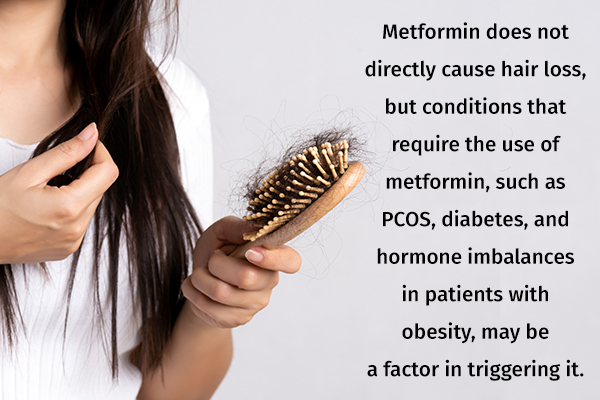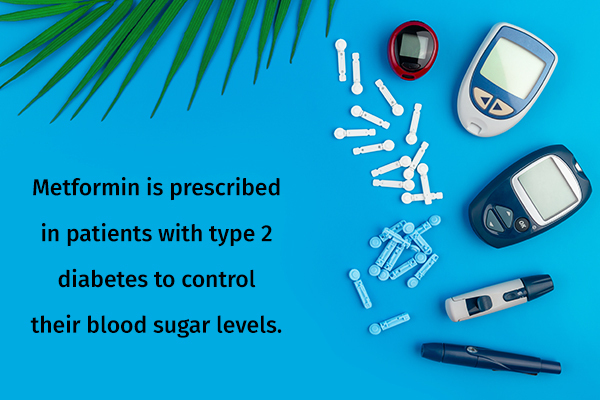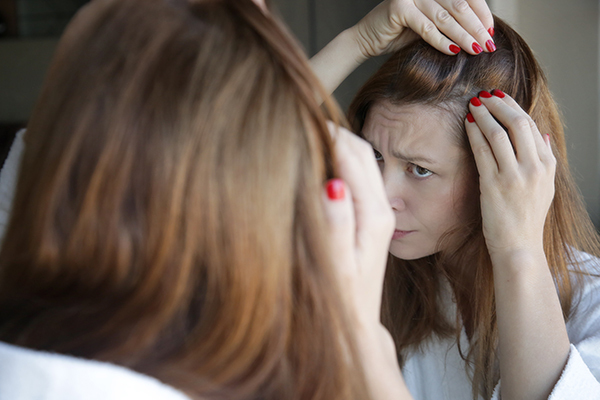In this article:
Hair loss is a distressing problem for many. In fact, it is estimated that more than 30 million people in the United States suffer from mild to severe forms of hair loss.

Many factors are behind this condition. It may be hereditary or triggered by hormone imbalance, an autoimmune disorder, or certain medicines.
Recently, there have been some reports of metformin, a common antidiabetic medication, causing hair thinning in some people. This article will take a deeper look at what metformin is and whether it causes hair loss in any form.
What Is Metformin and Its Use?
Metformin is the most common medicine used for the management of blood sugar levels in type 2 diabetes, particularly in patients with obesity. (1)
The chemical name of metformin is N,N-dimethylbiguanide. This medication treats high blood sugar levels by increasing insulin sensitivity and reducing glucose production in the body.
Recent studies indicate that metformin may also play a role in the management of polycystic ovarian disease (PCOD), obesity, and other metabolic diseases. (2)(3)
Does Metformin Cause Hair Loss?

There have been some recent reports of metformin causing hair loss in some people. However, most of these reports are unconfirmed, and there is no established link between the use of metformin and hair thinning. The onset of hair loss may have been triggered by other factors apart from the medication.
On the other hand, multiple research studies have demonstrated the positive effects of metformin use on hair growth. Metformin may help reverse androgenetic alopecia by treating women suffering from PCOD. (4)(5)(6) Topical metformin application also helped regrow hair in two patients suffering from cicatricial alopecia.
It may be worth mentioning that other common medicines used to control high blood sugar levels, such as Teneligliptin, can lead to hair loss in some patients. Hence, people on combination medicines containing both may experience some degree of hair thinning. (7)(8)
In conclusion, metformin does not directly cause hair loss, but conditions that require the use of metformin, such as polycystic ovary syndrome (PCOS), diabetes, and hormone imbalances in patients with obesity, may be a factor in triggering it. (9)
Indirect Correlation Between Hair Loss and Metformin
There may be some indirect connection between metformin and certain issues such as vitamin B12 deficiency. Long-term treatment with metformin can cause vitamin B12 and folic acid deficiency in some patients. This can be a factor in causing hair fall or slowing down hair growth. (10)
Home Remedies that Help Avoid Hair Loss While Taking Metformin
Here are a few simple steps you can take to avoid hair loss while taking metformin:
1. Take vitamin B12 supplements

Ask your doctor to prescribe you a vitamin B12 supplement if you are taking metformin. This may help prevent vitamin B12 deficiency in the body.
2. Avoid stress
Chronic stress is a major contributing factor to hair loss. Some studies on mice have demonstrated that the stress hormone, cortisol, can inhibit the production of new hair from stem cells.
3. Ensure proper dietary intake
A healthy diet is necessary for every aspect of your health. Eating foods rich in protein, vitamin B, vitamin E, calcium, etc., promotes the growth of strong and healthy hair and reduces hair fall.
4. Control blood sugar levels

Metformin is prescribed in patients with type 2 diabetes to control their blood sugar levels. (1) Type 2 diabetes is a metabolic disorder and requires dietary management as well as physical exercise to reduce blood sugar.
Control your sugar by following such plans such as:
- Make sure to walk for at least half an hour every day.
- Consume protein- and fiber-rich foods.
- Reduce your calorie intake by swapping high-calorie foods such as sugar and all-purpose flour with low-calorie options such as whole grains and quinoa.
- Avoid processed foods such as store-bought ramen, cookies, and soda.
5. Exercise and reduce body fat
Patients with diabetes may benefit from losing 5%–10% of their body fat. It is important to be physically active to regulate your blood sugar levels.
Low-intensity exercises such as walking, yoga, gardening, and a few push-ups a day are excellent for maintaining a healthy weight.
6. Regulate hormone levels in PCOD
PCOS is a common hormone disorder that affects a significant portion of women. It has been linked with hair loss in many cases. (11)
If you are suffering from PCOS, it is important to follow your doctor’s instructions for proper management of the condition. This may include regular hormone tests, dietary changes, medications, and exercise.
What Are the Possible Side Effects of Metformin?
Metformin may have side effects with long-term use. However, your doctor will prescribe metformin only if the benefits far outweigh the risks.
The most common adverse effects of metformin are:
- Nausea
- Vomiting
- Lactic acidosis (a condition in which lactic acid accumulates in the blood)
- Chest pain
- Allergic reactions (rashes, wheezing, etc.)
Most-Asked Questions About Metformin

Will metformin make my hair grow back?
Maybe. Many studies have indicated that metformin helps lower blood sugar levels and regulate PCOS and PCOD in women. Management of PCOS, PCOD, and diabetes helps reverse hair loss triggered by these conditions.
Why does metformin make you lose hair?
Metformin does not directly cause hair loss. However, it may lead to vitamin B12 deficiency in some people. Vitamin B12 plays an important role in hair growth and generation.
Is it OK to abruptly stop taking metformin?
No. Consult your doctor before stopping any diabetes medications.
Final Word
There is very little research on the link between metformin and hair loss. However, it is safe to conclude that metformin does not trigger hair loss per se, but it may cause a deficiency in vitamin B12 and slow down hair growth.
In fact, conditions such as PCOS, PCOD, and diabetes (that require the use of metformin) may be a factor in triggering hair loss. In such cases, metformin treatment may actually help regrow hair by regulating blood sugar and hormone levels. (12)
- Was this article helpful?
- YES, THANKS!NOT REALLY


